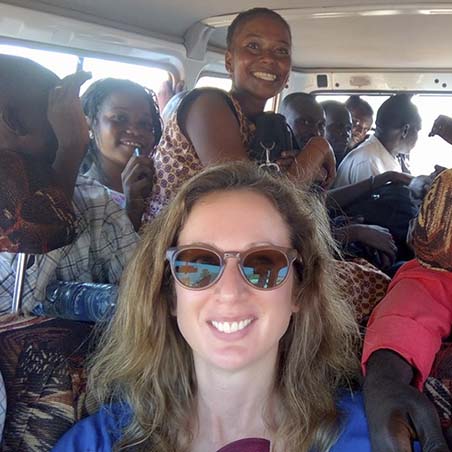Laura Bain
Media and Communications Specialist and Trainer
Bachelor of Journalism, 2012
….a low-risk project…suddenly became very high risk. The journalists became a target very quickly.
In these moments of crisis, journalism is even more important. The journalists that are on the ground, and not the international reporters but the local reporters who have no option to leave in some cases, need to be supported, and encouraged, and to know that they’re not alone.
Laura Bain, BJ’12 is considering her work, which she loves, and from which she is taking a much-needed break. Reflecting on the situation in the Ukraine and Eastern Europe, she’s also thinking about journalists she’s met in similar contexts and for whom she cares deeply.
A trainer and advocate for journalists in countries where reporting the facts is dangerous, she’s just finished a gruelling contract as the Senior Media Adviser for Internews in Myanmar. Internews is a not-for-profit organization that partners with local media around the globe to support the verification and dissemination of trustworthy information. Laura hadn’t worked for Internews before but had worked with similar groups. She was one month into her contract with Internews in Southeast Asia, when Myanmar’s military deposed the head of the ruling party and Nobel laureate, Aung Sang Suu Kyi.
What that meant, she says, “[Is] a low-risk project, suddenly became very high risk. The journalists became a target very quickly.” For Laura, who was not yet in Myanmar it meant a change in priorities. She was now managing a crisis.
She describes the project as going “off-grid” and turning “dark”. Her focus now was to assist in the redesign of the program, to still offer much-needed support to partners while ensuring their safety and the safety of her staff. She can’t say much about how it worked, except the operation was sophisticated.
Eventually she and her team set up a training hub for journalists in Northern Thailand which borders on Myanmar. That’s when their attention could return to supporting Myanmar journalists in their reporting. Laura says the typical challenges arose, “Some media outlets were just republishing each other’s stories without independently verifying them.” So, Internews offered workshops on “basic journalism skills, ethics, and fact checking.” Laura and her team also created a human rights reporting guidebook with “simple rules and reminders to be translated into Burmese and distributed to the people that need[ed] them.”
Challenges aren’t new to Laura. Working in other countries where democracy and freedom of the press can be ephemeral, she’s had to continually adapt, and problem solve. Like in Juba, where she was team leader on the South Sudan Program, with Journalists for Human Rights (JHR). That’s where she says she and her team ended up training more than just the journalists. She says the government and the security sector also came to the table to learn the function of media and the media laws of South Sudan. Her colleagues also “had the desire to do human rights reporting. To learn how to do it, and [to] discuss issues like gender-based violence and inequality,” despite the very real risks of doing so in a public forum.
Laura’s interest in human rights and journalism began at York University where she first joined Journalists for Human Rights (JHR), Canada’s largest media development organization. Through them, she took an internship in Ghana, which turned into a job. Bain says being in West Africa was life changing, but “I realized I needed to learn the basic skills of journalism.” That’s why she applied for the one-year Bachelor of Journalism program at Kings. “I kind of started in reverse” she jokes.
After completing her degree at King’s, Laura worked with traditional media organizations. First, she worked at CBC News Network in Toronto, then to Al Jazeera in Qatar, after which she worked for the public broadcaster, TRT, in Turkey to help launch their English network. It was in Istanbul, she realized, “There still was this desire to go back to do more of the media development work and the training; to work with journalists who were operating in much more challenging environments.”
One course Laura took at King’s, she says follows her everywhere she goes. “The ethics course really helped me in making challenging editorial decisions in various countries and contexts, ensuring not to do any harm to partners or sources I worked with, especially regarding human rights reporting. And to really think hard about the impact a story could have on someone’s life before publishing it.”
After working on Myanmar for the last year, Laura’s exhausted and burnt-out “from back-to-back, intense postings.” She’s taking a year off to travel and re-assess, telling herself, “It is hard to see how dark the world can be and how awful people can be to each other. But there’s always the flip side where you see the most amazing, inspiring people that you’d ever come across.” Laura says it’s these “amazing resilient people” who sustain her and whose stories she might want to tell next.
